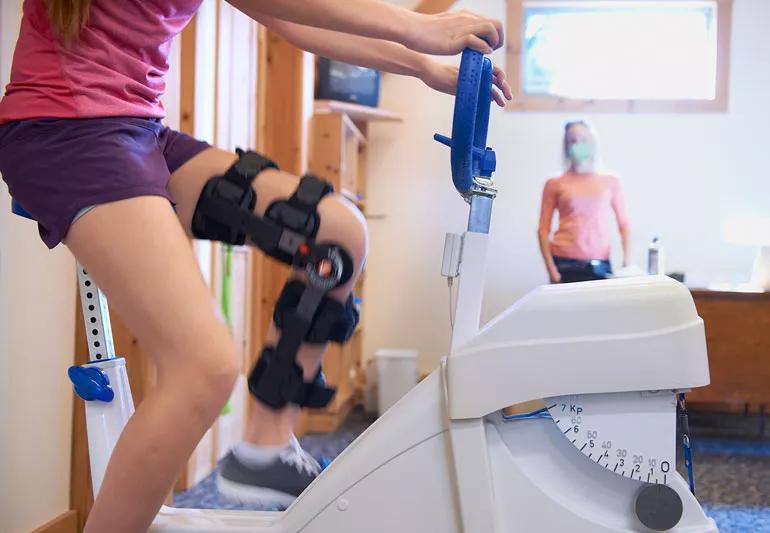Common questions you should ask to find a rehabilitation solution that’s right for you

After an injury, trauma or medical procedure, finding the right rehabilitation facility for your specific needs is an important step in your recovery. It’s a good idea to know how its team plans to work with you while you’re there and how they can help transition you home.
Advertisement
Cleveland Clinic is a non-profit academic medical center. Advertising on our site helps support our mission. We do not endorse non-Cleveland Clinic products or services. Policy
“Each facility can differ greatly in terms of services, so you’ll want the most comprehensive program for your personal rehabilitation goals,” says rehabilitation specialist Francois Bethoux, MD.
“You’ll want to consider things like an understanding of the specific treatment plans that are available to you, what extra services are offered by the staff, or what level of family participation you can expect, to name a few,” Dr. Bethoux says.
He suggests you and your doctor consider these 10 questions to ensure you’ve found the one that works best for you.
First, think about what kind of rehabilitation you are looking for based on the specific reason you need treatment. Confirm that the physicians at the facility prescribe therapies appropriate for the specific medical event that caused your need for rehabilitation, and for your treatment goals.
Common reasons you might need rehab include:
Licensed rehabilitation facilities require that patients receive at least three hours of therapy daily, five days a week.
If your recovery program requires care that’s outside of daytime hours or you need some type of medication or service at night, make sure you choose a facility that can accommodate those times. You’ll want to inquire if around-the-clock physician coverage is provided, and also if you’ll be working with different caregivers at different times.
Advertisement
You may wish to ask which members of the staff have advanced degrees or are board-certified. You may also want to know if the nursing staff includes registered nurses certified in rehabilitation nursing and/or if they’re experienced in acute care. (The purpose of acute care is to improve health within a shorter amount of time to prevent more chronic conditions from developing.)
It’s common that fully developed treatment plans involve partnerships among a variety of medical professionals. Together, they make up the full team that will generate a specific treatment plan for you. For example, physicians and nurses may work together with physical, occupational, speech/language therapists, recreational therapists, psychologists or social workers. It often takes a team of many to administer the plan that works best for you to fully recover.
Individual appointments may sometimes be preferable. They allow therapists to tailor a plan to meet your specific needs. Group settings on the other hand may offer encouragement, emotional support, connection and social opportunity.
Find out what other non-medical services the facility provides — like personal or group activities or other therapies that promote healing, nutrition and well-being. Some examples include:
Facilities may also offer in-person or online support groups for a variety of needs including mental health and post-treatment group support.
During your care or once it’s complete, you may need help navigating the non-medical part of your treatment — like billing, insurance or at-home therapies. Ask if patients are assigned to social workers or case managers who can help coordinate at-home services or who can help verify insurance benefits and understand your billing and expense questions. If needed, ask who from the staff will be your point of contact to assist you for any followup care.
A partnership involving the patient, family and medical providers is crucial to maximizing every opportunity for recovery. Find out how involved family members are allowed to be and if they’re encouraged to observe therapy, participate in meetings and learn how to assist in caregiving. Ask if the facility offers easy access to information online for your family or at-home caregivers.
Advertisement
Ask if there will be follow-up comprehensive services, including outpatient therapy and home care, available through rehabilitation professionals in your area. Your doctor or the facility itself may provide a list for your reference.
You’ll likely want to choose a facility that works directly with your referring physician so all of your information is in the same place. Find out if your rehabilitation team can easily access your medical history, medication lists, radiology and laboratory results, and treatment status electronically or online. Some facilities may also provide electronic, app or online assistance with appointment or treatment scheduling for you and your family.
“Your doctor can make a referral for you, and together you can easily find a facility that’s ideal for your situation,“ Dr. Bethoux says. “Once you’ve narrowed it down it’s a good idea to arrange for an in-person tour or attend a lecture that many of these organizations sponsor. All of this will help give you a clear picture of what to expect on your rehabilitation journey.”
Advertisement
Learn more about our editorial process.
Advertisement

To help preserve your cognitive function, try to keep your brain active, manage fatigue and learn new organizational skills to conserve energy

Dysarthria affects how you speak, while aphasia impacts how you use and understand words

Your scar will heal best if you keep the area clean, dry and covered for an appropriate amount of time

Absolutely! In fact, in many ways, exercise is key to recovery

It’s important to remember that not everyone heals at the same rate

You may notice a decrease in your LDL ‘bad’ cholesterol in about four weeks

Options for your changing mobility range from small swaps to major renovations

Chilblain-like skin lesions and rashes are mild (and rare) complications of many viral infections, not just COVID-19

Wearing a scarf, adjusting your outdoor activities and following your asthma treatment plan can help limit breathing problems

Your diet in the weeks, days and hours ahead of your race can power you to the finish line

When someone guilt trips you, they’re using emotionally manipulative behavior to try to get you to act a certain way